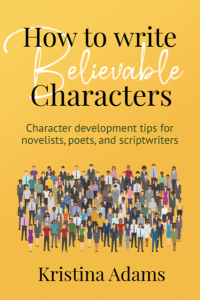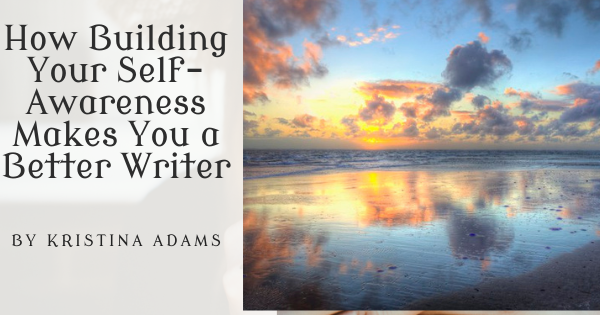by Kristina Adams , @writingcookbook
Self-awareness helps us to recognise our positives and negatives without being harsh or judgmental. We know things are what they are, and we know that if we dislike something, it’s completely within our power to change it.
It can help us deal with stress, anxiety, depression, and even physical health conditions like fibromyalgia and chronic fatigue syndrome. (I know this as a sufferer of all of the above for many years).
Some people are naturally more self-aware than others, but, like everything in life, it’s a skill that can be learned.
Sometimes self-awareness comes from trauma, counselling, or a treatment programme for a health condition. Occasionally it comes from a desperate need to improve ourselves.
But one important thing to remember is that you can’t think your way into becoming more self-aware. Reading tips on how to do it is a good starting point, but it’s the actions you take that will build your self-awareness.
Now, how does this all tie into writing?
Well, let’s take a look at how self-awareness makes you a better writer:
You’re more objective
One of the best things about self-awareness is an ability to pull yourself out of your own mind and see things more objectively.
Objectivity is a really helpful tool to use when facing our emotions, but it’s also helpful for facing our writing.
Editing can be an expensive and time-consuming process. When you’re more self-aware, you’re more open to the fact that your first draft (or even your finished book) won’t be perfect—there will always be things you can do to improve.
Not in a “your writing sucks” kind of way, but in a, “writing is a journey, and each book is a stop along that journey” kind of way.
When you view your own work objectively, you’re more likely to read it critically, like a reader, reviewer, or editor would. That makes it easier for you to spot plot holes, unintentionally flat characters, and overly used phrases. All these things make for a better finished story by the time you’re done.
You learn to spot areas for improvement
Everyone has areas they can improve on. If none of us did, our lives would be super boring.
There’s always a new skill we can learn, a new approach to an old technique, or a new way of looking at a problem. This endless sea of writing techniques is one of the great things about writing—it doesn’t matter how long you’ve been publishing for, there’s always something to learn.
Self-awareness means you don’t mind that you have areas to improve on. Your relish in those areas because they’re a new challenge.
Facing—and overcoming—new challenges builds our confidence, our resilience, and yes, our writing skills.
You’re comfortable in who you are
Nobody is perfect, but self-awareness means we’re not hard on ourselves for just being, you know, ourselves.
It’s really easy to get into a vicious cycle of self-hatred and self-loathing, especially when so many of us can’t go outside right now, but the more you ruminate on these feelings, the worse you’ll feel and the less you’ll get done.
And the further away you’ll push your writing, because you don’t feel worthy of doing it.
Self-awareness means you can identify these feelings, learn the ways to healthily pull yourself out of them, and face them faster.
It’s not about fixing your life’s problems—it’s about acknowledging that they’re holding you back, but you’ve totally got this. When you acknowledge problems—even ones outside of your control—it’s much easier to let them go.
You understand emotions
Well-articulated emotions are key to readers developing a close relationship with your characters. But to be able to write emotions in depth, you need to understand them.
If you’re constantly pushing your emotions away, bottling them up, or refusing to acknowledge that you even have them…how can you write about them?
Readers can’t get emotionally attached to characters they don’t know that well. The deeper you explore your characters’ emotions, the more your readers get to know them. They’ll then be more invested in your story and want to buy more of your books.
Some of my favourite authors do this suuuuuper well, to the point where I’ve almost been crying when the characters cry in the book. These deeper emotions make your reader feel like they’re living those emotions alongside your character—they’re in your character’s red stilettos or scruffy Converse—and they just need a good cry. Or kiss. Or mystery solved. You get the idea.
You know your triggers
We all have triggers. Sometimes they’re triggers that stop us from doing the very thing we want or need to do; sometimes they cause a panic attack; sometimes they make our chronic pain flare up; sometimes they give us writer’s block.
You can’t overcome your triggers if you don’t know what they are. Noticing them, and acknowledging them, helps you to face them. You can train your brain to not associate exercise with pain, or a blank Word document with writer’s block.
We become who—and what—we think we are, and so the more we ruminate on things that we think trigger us, the more likely they are to trigger us.
When you offer yourself some comfort, whether that’s some time with a good book, your favourite TV show, or a walk with the dog, it calms your brain and stops it from associating an event with a specific feeling.
One way to comfort yourself, if you find yourself struggling, is to talk to yourself. Remind yourself that you’re OK, you’re safe, and you’ve totally got this.
It sounds bonkers, but I’ve used this technique many times and found it one of the best ways to deal with my anxiety, anxiety-triggered fatigue, and chronic pain.
You’re kind to yourself
Most of us are too hard on ourselves.
Self-awareness teaches you when you need to be kind to yourself, and when you can push yourself further.
Take my new exercise regime as an example. I’m incredibly unfit thanks to asthma and chronic pain. I tried to do ten minutes a day for three days in a row, and by the end of day three, I couldn’t walk. I hadn’t listened to my body’s protests as I walked down the stairs, when it was telling me I needed to lay off the exercise so that it could recover.
I ended up walking down the stairs swearing for almost a week.
Take two: I’m going to alternate exercise days, to give my body time to recover. And also alternate types of exercise—walking the dog is a lot less strenuous than weights or core.
The pain in my legs was my body’s way of telling me I needed to slow down, but I hadn’t listened to it.
Sometimes, when you’re stuck, it can be your brain’s way of telling you to rest. One of the ways I identify this, is when it feels like something is buzzing in my brain. Like there’s a bee there, and it won’t go away.
Other times, my eyes tell me by making the words on the screen blurry.
Or sometimes it’s my hands, when typing becomes painful during a long writing session.
Our body warns us to slow down in a variety of subtle ways; we just don’t always listen to it.
But take it from someone who’s burned herself out more times than she can count: you’ll achieve more by slowing down now, than by forcing yourself to keep going and hitting breaking point.
You know when to challenge yourself
While being kind to yourself is important, you won’t grow if you don’t challenge yourself. Self-awareness teaches us what those slow down warnings look like, so that we know when it’s actually a situation we can push ourselves through.
Many, many things in life are mind over matter. Ask any personal trainer and they’ll tell you that most people can exercise more than they think, but they’re scared to push themselves beyond their comfort zone and feel the burn the next day. Writing is similar.
Sometimes we’re afraid of writing about something that’s a new experience to us, or we’re afraid of going to that deep, dark place in our character’s minds. Since we have to go to that place in our own minds in order to write, and edit, it.
But when we tap into those places we’re afraid to go to, the outcome is amazing.
One of my friends is about to publish her first book. When she was editing it, she knew that it was missing how cold the main character needed to be for the story to work.
So I set her a challenge. I asked her to go to the darkest places in her mind and write about how angry past people and events made her. She was afraid of the exercise, but she did it.
And when she came out the other side, she felt like a different person. She was no longer afraid to tap into those dark places, because she’d done before and survived it. There were no repercussions to her exploring her full depth of emotions. She needed to know and accept that before exploring it in her fiction.
There’s no shame in feeling what you need to feel, nor is there shame in not being ready to face something that’s happened to you. But the longer you put off facing the inevitable, the harder it becomes to challenge yourself, and the further away you are from your writing goals.

Kristina Adams is the author of twelve books and too many blog posts to count. She helps writers overcome their creative obstacles on her blog, podcast, and courses, over at The Writer’s Cookbook. When she’s not writing, she’s inflicting cooking experiments on her boyfriend or playing with her dog, Millie.
7 Ways Building Self-Awareness Makes You a Better Writer (by @WritingCookbook ): Share on X
Photo credit: blavandmaster on VisualHunt / CC BY-NC-SA


Thanks so much for this post, Kristina! The part about listening to our bodies especially resonated with me. I didn’t once and was in physical therapy for months afterward. Carpal tunnel is another sign. So important to pay attention and be kind to ourselves.
I hadn’t really thought about it this way, but it does make a lot of sense that self-awareness helps writing. After all, writing comes from our selves. So the better we know and take care of ourselves, the more meaningful the writing becomes. Thanks for this perspective!
Our body will tell us when we need to slow down. Stretching a little is good and there will be pain but stretching a lot just breaks us down. (And I mean that in physical and mental terms.)
Great list!